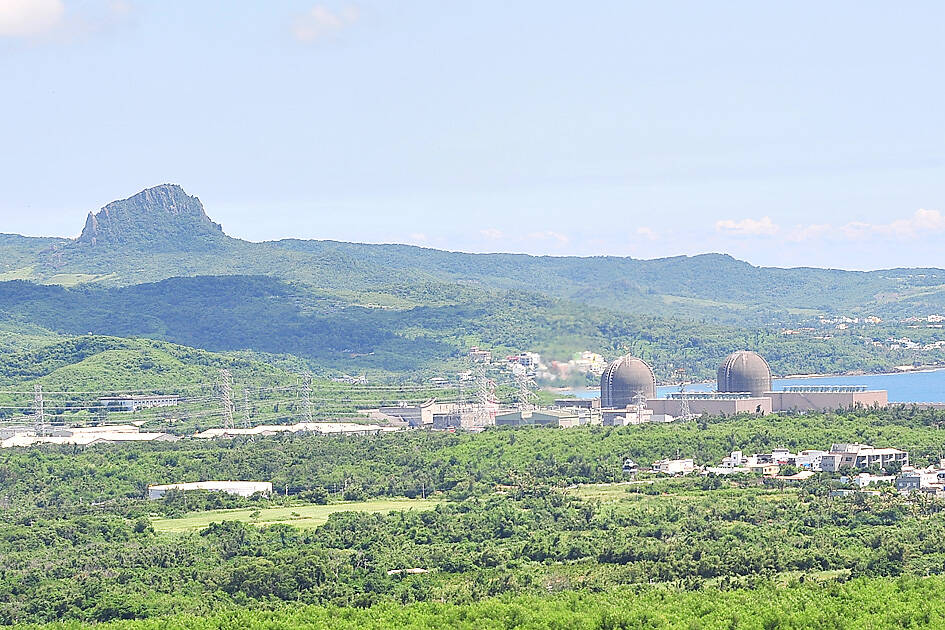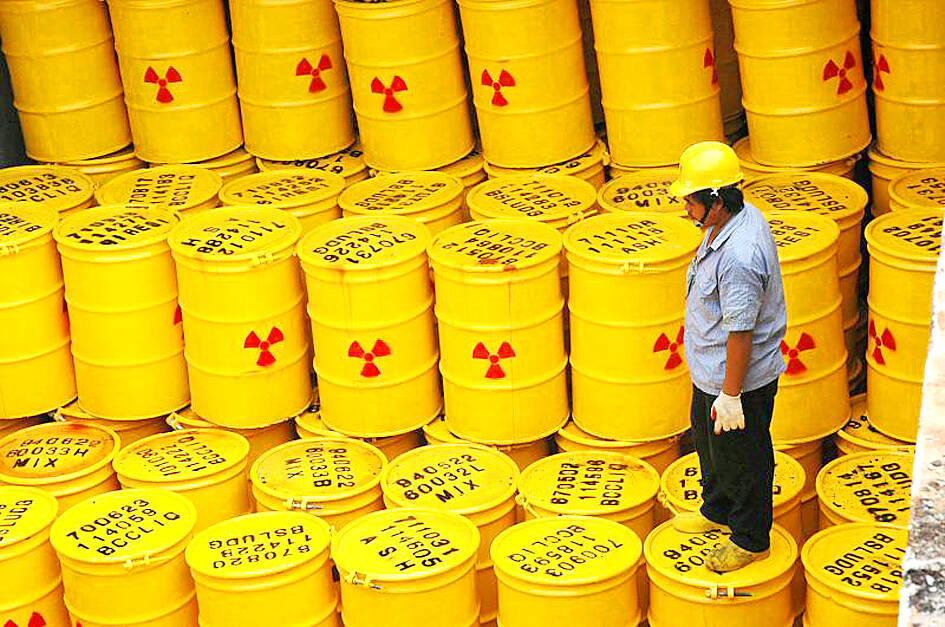Taiwan’s last operating nuclear reactor gradually began to reduce its power generation yesterday afternoon before completely shutting down at midnight, fulfilling the government’s promise to make Taiwan nuclear-free.
The No. 2 reactor at the Ma-anshan Nuclear Power Plant in Pingtung County was disconnected from the nation’s power grid at 10pm, state-run Taiwan Power Co (台電, Taipower) said.
The removal of the reactor core’s fuel rods is expected to start two days later and last one to two weeks, the company said.

Photo: Tsai Tsung-hsien, Taipei Times
The fuel rods would be stored in spent fuel pools.
The reactor has generated less than 3 percent of Taiwan’s electricity at times of peak demand, but alternatives would make up for the shutdown, Taipower said.
New gas-fired units with capacity of about 5 gigawatts would be added to Taiwan’s electricity mix, far exceeding the 950 megawatts produced by the No. 2 reactor at Ma-anshan, it said.

Photo: CNA
The Cabinet has said it has no plans to extend the No. 2 reactor’s operation even though the Legislative Yuan passed an amendment earlier this week allowing nuclear facilities to extend their operating lifespans by 20 years.
The phasing out of nuclear power has been a goal of the ruling Democratic Progressive Party (DPP) even before it took power in May 2016.
Nuclear power accounted for more than 16 percent of the nation’s energy mix before 2015.
The DPP has advocated eliminating nuclear power in favor of renewable energy and fossil fuels.
Although the DPP in 2016 set a goal of renewable energy generating 20 percent of the nation’s electricity by this year, it would likely fall short of the target, after alternative energies accounted for 11.6 percent of energy generation last year, according to Energy Administration statistics.
Fossil fuels accounted for more than 83 percent of Taiwan’s energy mix last year, including 39.3 percent coal, complicating the fight to reduce carbon emissions.
Local residents have mixed opinions on the Ma-anshan Nuclear Power Plant, which began operations in 1984.
Chang Tao-hung (張道宏), whose family has lived in Hengchun Township’s (恆春) Tougou Village (頭溝) for five generations, said he opposed extending the Ma-anshan plant, because Taiwan’s high population density, limited land area and active fault lines made it unable to withstand a nuclear disaster.
The plant being near a fault line poses a high risk, Chang said, adding that there is no definitive solution for the disposal of nuclear waste in Taiwan.
Pingtung County Environmental Protection Alliance president Chang Yi (張怡) said that after the Ma-anshan plant’s decommissioning, the site would be used for the installation of solar panels.
Considering that, land speculation, the unstable supply of power and the tarnishing of the local landscape could be issues of concern, Chang Yi said.
Nuclear power is superior in output stability, carbon footprint reduction and cost-effectiveness compared with other alternatives, but the challenges of spent nuclear fuel disposal negate these advantages, Taipower said.
The Nuclear Backend Fund (核能發電後端營運基金) would need at least NT$477.4 billion (US$15.8 billion), it said, adding that the price tag might increase to NT$500 billion due to inflation.
Spent fuel rods from reactors are supposed to be removed to the reactor pool extension for temporary storage, followed by indoor or outdoor dry storage, centralized storage, then final disposal in a permanent storage facility, Taipower vice president Tsai Chih-meng (蔡志孟) said on Friday.
Due to legal disputes with New Taipei City, only the Jinshan Nuclear Power Plant has an outdoor dry storage facility, he said.
The Jinshan and Guosheng nuclear power plants need additional capacity in indoor and outdoor dry storage, and the Ma-anshan plant’s indoor dry storage would not be completed at least until 2031 he said.
Taiwan’s three nuclear power plants produced half of the nation’s electricity at their peak, but dropped to a quarter of the total after being overtaken by coal-fired plants in the 1990s, it said.
Last year, nuclear power contributed to 4.2 percent of the nation’s energy mix, public information published by the government-run Environment Information Center showed.

CHAOS: Iranians took to the streets playing celebratory music after reports of Khamenei’s death on Saturday, while mourners also gathered in Tehran yesterday Iranian Supreme Leader Ayatollah Ali Khamenei was killed in a major attack on Iran launched by Israel and the US, throwing the future of the Islamic republic into doubt and raising the risk of regional instability. Iranian state television and the state-run IRNA news agency announced the 86-year-old’s death early yesterday. US President Donald Trump said it gave Iranians their “greatest chance” to “take back” their country. The announcements came after a joint US and Israeli aerial bombardment that targeted Iranian military and governmental sites. Trump said the “heavy and pinpoint bombing” would continue through the week or as long

TRUST: The KMT said it respected the US’ timing and considerations, and hoped it would continue to honor its commitments to helping Taiwan bolster its defenses and deterrence US President Donald Trump is delaying a multibillion-dollar arms sale to Taiwan to ensure his visit to Beijing is successful, a New York Times report said. The weapons sales package has stalled in the US Department of State, the report said, citing US officials it did not identify. The White House has told agencies not to push forward ahead of Trump’s meeting with Chinese President Xi Jinping (習近平), it said. The two last month held a phone call to discuss trade and geopolitical flashpoints ahead of the summit. Xi raised the Taiwan issue and urged the US to handle arms sales to

BIG SPENDERS: Foreign investors bought the most Taiwan equities since 2005, signaling confidence that an AI boom would continue to benefit chipmakers Taiwan Semiconductor Manufacturing Co’s (TSMC, 台積電) market capitalization swelled to US$2 trillion for the first time following a 4.25 percent rally in its American depositary receipts (ADR) overnight, putting the world’s biggest contract chipmaker sixth on the list of the world’s biggest companies by market capitalization, just behind Amazon.com Inc. The site CompaniesMarketcap.com ranked TSMC ahead of Saudi Aramco and Meta Platforms Inc. The Taiwanese company’s ADRs on Tuesday surged to US$385.75 on the New York Stock Exchange, as strong demand for artificial intelligence (AI) applications led to chip supply constraints and boost revenue growth to record-breaking levels. Each TSMC ADR represents

Pro-democracy media tycoon Jimmy Lai’s (黎智英) fraud conviction and prison sentence were yesterday overturned by a Hong Kong court, in a surprise legal decision that comes soon after Lai was jailed for 20 years on a separate national security charge. Judges Jeremy Poon (潘兆初), Anthea Pang (彭寶琴) and Derek Pang (彭偉昌) said in the judgement that they allowed the appeal from Lai, and another defendant in the case, to proceed, as a lower court judge had “erred.” “The Court of Appeal gave them leave to appeal against their conviction, allowed their appeals, quashed the convictions and set aside the sentences,” the judges